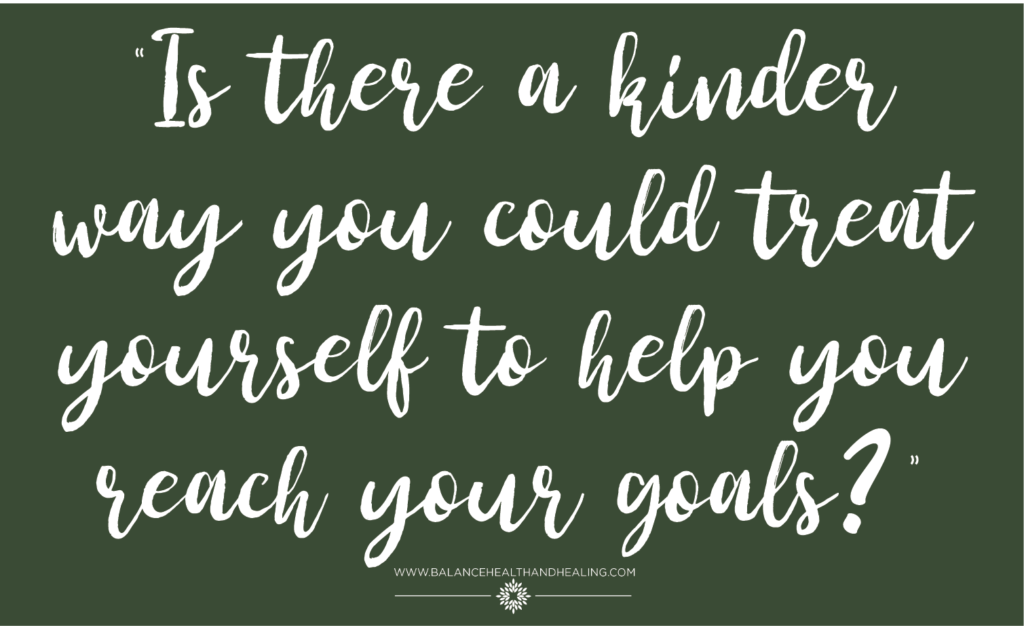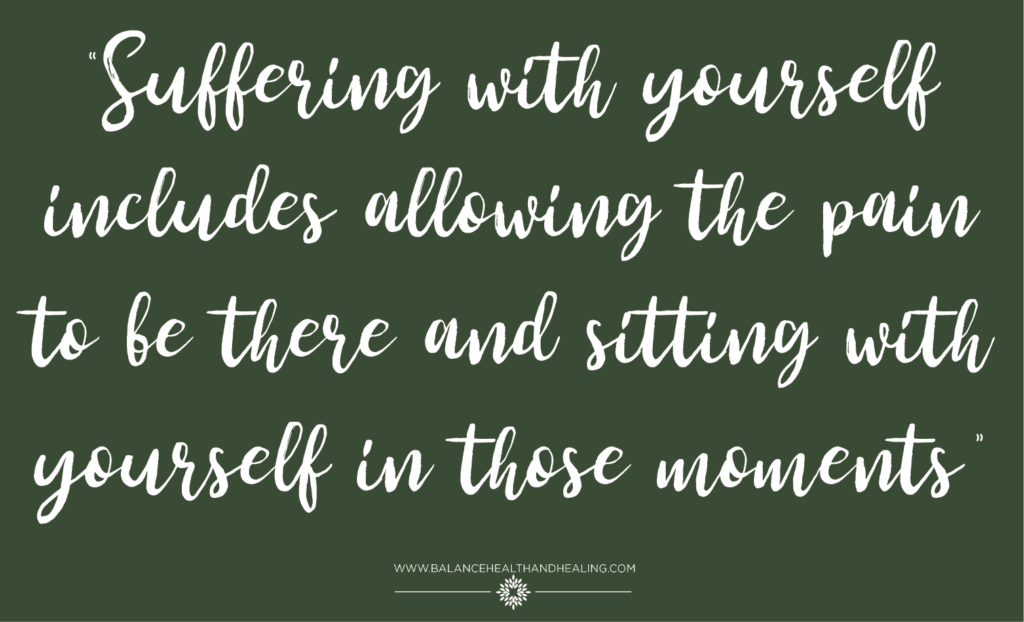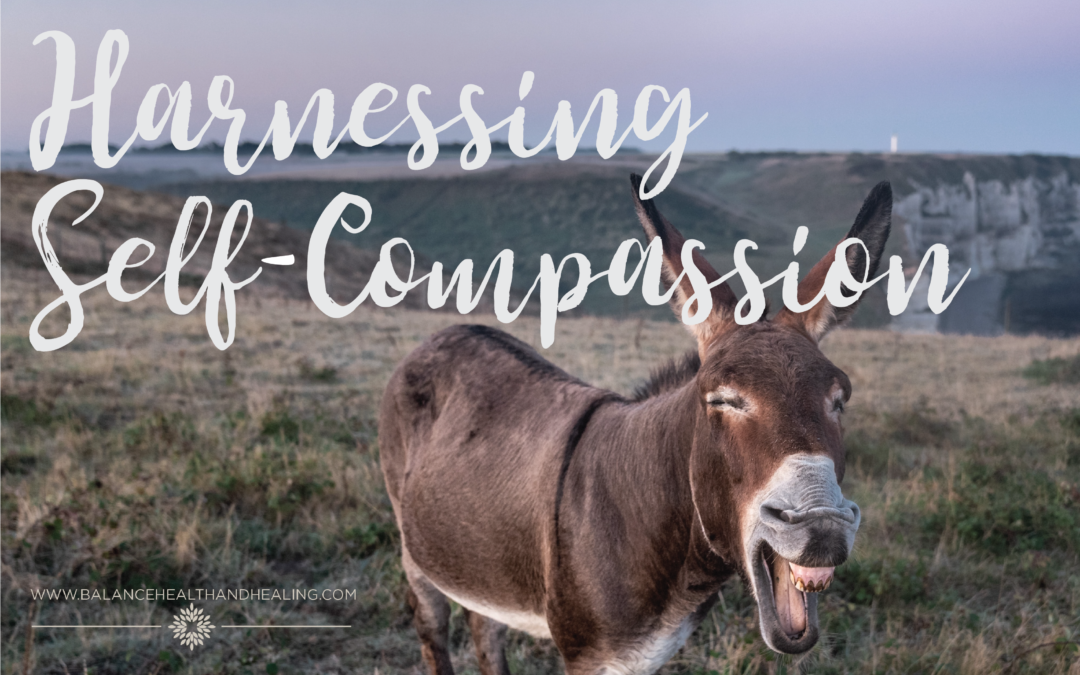I once heard it said that you can motivate a donkey to carry you to town in one of two ways: you can whip the donkey, forcing him to move out of fear of pain, or you can hold carrots in front of him, lovingly encouraging him to move forward to receive his next reward. Both are legitimate ways to get the donkey to do what you need him to do.
 In what ways are you the donkey in this story, whipping yourself repeatedly? Is there a kinder way you could treat yourself to help you reach your goals? Underlying this story is the power of self-compassion. In our culture, we tend to not be very good at self-compassion: we resist taking care of ourselves and loving ourselves, instead whipping ourselves with self-comparison or self-criticism. Sometimes this is because people worry that if they aren’t hard on themselves, they’ll never get to where they need or want to be. In reality, the exact opposite is true. Research has shown that self-compassion decreases psychopathology and shame, and increases productivity, ability to give to others, relationship satisfaction, and ability to look after oneself. If the donkey will carry you to town more reliably for carrots, the same is true for you – you will actually be able to live a meaningful and valuable life if you exercise self-compassion.
In what ways are you the donkey in this story, whipping yourself repeatedly? Is there a kinder way you could treat yourself to help you reach your goals? Underlying this story is the power of self-compassion. In our culture, we tend to not be very good at self-compassion: we resist taking care of ourselves and loving ourselves, instead whipping ourselves with self-comparison or self-criticism. Sometimes this is because people worry that if they aren’t hard on themselves, they’ll never get to where they need or want to be. In reality, the exact opposite is true. Research has shown that self-compassion decreases psychopathology and shame, and increases productivity, ability to give to others, relationship satisfaction, and ability to look after oneself. If the donkey will carry you to town more reliably for carrots, the same is true for you – you will actually be able to live a meaningful and valuable life if you exercise self-compassion.
Dr. Kristen Neff, expert in self-compassion, said that self-compassion is rooted in the belief of common humanity. Self-compassion does not involve self-pity or a “wo is me” attitude, instead it recognizes the shared human condition. Suffering is common to humanity, it makes us human, and we can love ourselves and each other through this suffering. Suffering is a part of life; we’ll suffer enough as it is, we don’t need to add to the pain by whipping ourselves through it. Self-compassion doesn’t mean you have to stop trying, think you’re perfect, become arrogant, or even love every part of yourself. Rooted in Buddhist philosophy, self-compassion means to suffer with yourself, to be there and show up for yourself when times are hard.
So, how do you go about beginning to practice self-compassion?
First, try and treat yourself as you would treat a good friend.
Think of how you respond when a friend comes to you to tell you she is going through a painful break-up. Do you say “well, it’s no wonder you got dumped, you’re really annoying” and rub dirt into her wound, adding to her pain? Chances are you do not. You suffer with her, show up for her, and remind her of all the things you love about her and tell her that this pain will not last forever. But, do you say those things to yourself when you go through similar painful experiences? These acts of mental punishment only add to your suffering. This often increases emotional pain rather than decreasing it.
Second, practice mindfulness during moments of beating yourself up.
Notice when you tend to say derogatory things to yourself, and instead, try to notice where you’re feeling emotional pain towards yourself and sit with that. What does the pain  feel like? Does it have a color? Does it move? What temperature is it? As mammals, we respond to warmth and touch. Perhaps tenderly cradle that part of your pain like you would cradle a crying baby. You don’t have to start chanting mantras of things you love about yourself, but you can show yourself that love by responding warmly to your own pain. Suffering with yourself includes allowing the pain to be there and sitting with yourself in those moments.
feel like? Does it have a color? Does it move? What temperature is it? As mammals, we respond to warmth and touch. Perhaps tenderly cradle that part of your pain like you would cradle a crying baby. You don’t have to start chanting mantras of things you love about yourself, but you can show yourself that love by responding warmly to your own pain. Suffering with yourself includes allowing the pain to be there and sitting with yourself in those moments.
I love self-compassion because of how it has transformed the way I relate to myself. As a recovering perfectionist, I used to hold myself to the highest standard – well, a perfect standard – and would be the first to beat myself up if I fell anything short of the best. Like that donkey, I was totally moving out of fear of pain! In short, it was a miserable and impossible way to live. Since practicing self-compassion through the simple techniques explained above, I have learned so much more about myself. I have given myself space to try new things and really SUCK at things without being terrified for what I would say to myself about it. It has been liberating to truly suffer with myself instead of rubbing dirt into my emotional wounds.
If you were able to suffer with yourself instead of whipping yourself, like that donkey, with thoughts of all the things you don’t like about yourself, you would always have someone to turn to. That is self-compassion. Imagine how much more possible your hardships could feel if you knew you always had at least one person in your corner: you!

